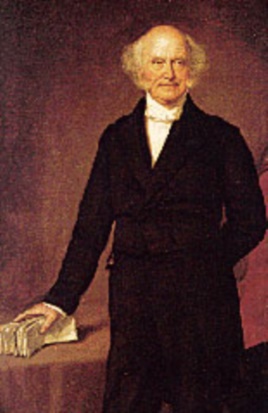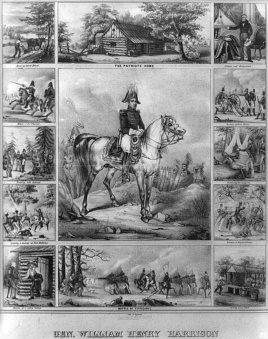VOA慢速英语:辉格党看到打败范布伦总统的机会
From VOA Learning English, welcome to the Making of a Nation, our weekly program of American history forpeople learning American English. I’m Steve Ember.
Last time, we talked about Martin Van Buren. He wassworn in as the eighth president of the United States in 1837. Not long after he took office, the United Statessuffered an economic depression. It lasted six years.
The depression was the major problem during VanBuren's presidency, but not the only problem.
In foreign affairs, one of the chief problems Van Burenfaced was a dispute with Britain about Canada.Canadian rebels had tried twice to end British rule overCanada. They failed both times.
Rebel leaders fled to safety in the United States. There they found it easy toget men and supplies to help them continue their struggle. The rebels built abase on a Canadian island in the Niagara River which formed part of theborder between the two countries.
The rebels used an American boat to carry supplies from the American side totheir base. In December 1837, Canadian soldiers crossed the Niagara Riverand seized the boat. One American was killed in the fight.
For a while, Canadian forces and the rebels exchanged attacks. A number ofAmerican citizens assisted the rebels.
President Van Buren was troubled. He declared that the wish to help othersbecome independent was a natural feeling among Americans. But he said noAmerican had a right to invade a friendly country. He warned that citizens whofought against the Canadian government, and were captured, could expect nohelp from the United States.
Another problem between the United States and Canada at that timeconcerned the border along the American state of Maine. That part of theborder had been in dispute ever since 1783. That was when Britain finallyrecognized the independence of the United States.
Years later, the king of the Netherlands agreed to decide the dispute. The kingsaid it was impossible to decide the border from the words of the peace treatybetween Britain and the United States. So he proposed what he believed was a fair settlement instead. The United States would get about twice as much of the disputed area as Canada.
Britain accepted the proposal. But the United States did not. The United Statesrefused because the state of Maine would not accept it.
In 1838, Britain withdrew its acceptance of the proposal. Canadians enteredthe disputed area. The governor of Maine sent state militia forces to the area. The soldiers drove out the Canadians and built forts. Canada, too, began toprepare for war.
President Van Buren sent General Winfield Scott to Maine. Scott was able toget the governor to withdraw his forces from the disputed area. He alsoreceived guarantees that Canadian forces would not enter the area. Thedanger of war passed.
Van Buren Blamed for Nation's Financial Problems
Americans in the border area, however, were angry with President Van Buren.They believed he was weak because he did not want war.
The president was losing support not only in the Northeast. People all over thecountry were suffering because of the depression. Most people believed VanBuren was responsible for their troubles because he continued the hardmoney policies of former president Andrew Jackson.
Historian Joel Silbey is an expert on Martin Van Buren. He says mosthistorians do not think Van Buren was a strong president. However, JoelSilbey says Van Buren left an important legacy.
 |
| Martin Van Buren, 8th President of the United States (1837–1841) |
“When it comes to the political system, he was a brilliant innovator.”
MartinVan Buren organized his political party, the group thatcame to be known as the Democrats. In the late 18thand early 19th centuries, people who supportedindependent farmers and states’ rights over a centralgovernment generally followed Thomas Jefferson. Theycalled themselves Democratic-Republicans orJeffersonian Republicans.
Jeffersonian Republicans opposed the Federalist Party.They believed the Federalists wanted a strong nationalgovernment, a powerful banking system and a small,elite social class.
But after Thomas Jefferson died, the JeffersonianRepublicans broke into factions. They divided theirsupport among several candidates during presidentialelections and, as a result, often lost.
Joel Silbey says one of the things Van Buren hadlearned was that, above all else, when you have anideology you want to fight for you need unity.
Van Buren organized political clubs and political leaders in New York that allsupported Jefferson’s ideas. He brought them together to talk about theirpolitical beliefs and choose a single candidate for their party.
In 1828 election, Van Buren had expanded this organization. His insistence onpolitical unity had helped elect Andrew Jackson. And his system of meetingseventually became the national conventions that political parties use today toofficially nominate their candidates.
Van Buren also helped create the modern political campaign. In the 1820s, henoticed many state constitutions were lifting some of their voting restrictions. As a result, more people were allowed to vote.
Historian Joel Silbey says Van Buren wanted to bring these new voters into hispolitical party.
“He borrowed from a couple minor parties the notion of popular campaigns,where you persuaded people through campaign rallies, speeches byprominent people, and on Election Day getting them out to vote by yourorganization’s agents.”
Joel Silbey explains that these techniques to persuade and mobilize voterswere new to national politics. Now they are some of the major features ofpolitical campaigns.
Van Buren Called "Innovator" and "Sly Fox"
Martin Van Buren’s political tactics earned him a few nicknames. Some calledhim “The Little Magician,” because he knew how to win elections.
Others called him “The Sly Fox of Kinderhook.” Kinderhook is the town in NewYork where Van Buren grew up. The term “sly fox” is not entirely positive. JoelSilbey says the nickname suggests that many people did not feel they couldtrust him.
“Van Buren is the first person to be seen as that — a manipulator. Unfairly, it was said he would do anything to win an election, and he had no realprinciples.”
However, Joel Silbey says Van Buren did what he thought was necessary topreserve Jefferson’s ideals.
In the election of 1840, Van Buren ran for a second term as president. Thistime his opponents used Van Buren’s political skills against him. Joel Silbeysays the Whigs used popular speeches and rallies to portray Van Buren as afailed president.
“During his re-election campaign in 1840, crowds of Whigs would chant, ‘Mattie Van is a used-up man!’ because he no longer had any power or effecton things.”
 |
|
Poster of William Henry Harrison's accomplishments |
The Whigs also nominated a military hero theybelieved the people would love. He was General WilliamHenry Harrison. Harrison had led an attack on Indians in the Indiana territory in 1811. Many people believed that the battle — at a place called Tippecanoe — was agreat victory for Harrison.
But Van Buren’s party, the Democrats, spoke of the 67-year-old Harrison as an "old lady." They called him"Granny Harrison." One Democratic newspaper saidthe old man did not really want to be president. It saidHarrison would be happier with a $2,000 a yearpension, a barrel of hard apple cider to drink and a logcabin to live in.
Hard apple cider was a popular drink among workingmen. And at that time a great many farmers still lived inlog cabins – houses made of rough logs.
The Whigs were the party of bankers and businessmen. They saw a chanceto use the Democrats’ statement to their own gain. It gave them a way topresent themselves as the party of the working man and the small farmer. "The statement is right!" they cried. "The Whig Party is the party of hard ciderand log cabins."
Whigs Embrace Harrison, Hard Cider, Log Cabins
The Whigs put up log cabins everywhere and offered free hard cider toeveryone. They organized huge outdoor meetings for thousands, with foodand drink for all. They held parades and marched with flags, bands andpictures of William Henry Harrison. Many campaign songs were written.These songs told of Harrison's bravery against the Indians. They told how heloved the hard and simple life of the common man -- even though he wasreally a Virginia aristocrat.
At the same time, the Whig campaign songs said Martin Van Buren lived like aking in the White House.
A Whig congressman charged that the White House had become a palace. He said Van Buren slept in the same kind of bed as the king of France and ateFrench food on gold and silver dishes.
The Democrats made their own claims. They said Harrison could not read orwrite. They said he would not pay people the money he owed them. And theycharged that Harrison even sold white men into slavery.
Senator Henry Clay said the campaign was a struggle between log cabins andpalaces, between hard cider and Champagne.
The state of Maine held elections in September of 1840. Voters in Maineelected a Whig, Edward Kent, as governor. They gave the state's electoralvotes to Harrison, celebrated as the hero of Tippecanoe, and to his vicepresidential candidate, John Tyler.
The election results produced a new song for the Whigs. "And have you heardthe news from Maine, / And what old Maine can do? / She went hell-bent forGovernor Kent, / And Tippecanoe and Tyler, too. "
One by one, the other states voted. The election was close in the popularvote. But Harrison received 234 electoral votes, compared to only 60 for VanBuren. And so William Henry Harrison became the ninth president of theUnited States.
I’m Steve Ember, inviting you to join us next time for the Making of a Nation —American history from VOA Learning English.
- 频道推荐
- |
- 全站推荐
- 推荐下载
- 网站推荐




















